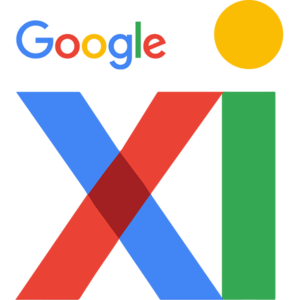
Megan Henshall says the Google Experience Institute is supposed to, in part, “accelerate the recovery of the industry and new solutions for the future.” (Laurel Belle Photography)
In early September, Megan Henshall, CMP, DES, shared on LinkedIn that she was part of an experimental “group project” at Google, where she is the global events account manager. It’s called the Experience Institute (Xi), she posted — “a small, internal/external, cross-functional community that is rethinking and reimagining the future of event and experience design.”
This community, Henshall told Convene, was “born out of a desire — and really a responsibility — to rethink how we design experiences for our audiences at Google. It’s composed of a number of Googlers who touch user and event experience design across the organization internally, but also a number of external folks from our strategic agency partnerships.”
Ultimately, Henshall said, “this work is not just meant to accelerate awesome stuff at Google, but also to accelerate the recovery of the industry and new solutions for the future.” Convene asked Henshall to share more about this initiative. Here are highlights of the interview.
Who is participating in Xi and who have you invited?
We’re inviting a lot of people from outside of the events industry to be “honorary community members” who will come and go and flex in and out of the work that we’re doing over time. We’re attempting to build this out as an evergreen community that will focus on events as they evolve over the next three to five years. I don’t really know how long this initiative will last, but there’s a lot of questions to answer and work to be done. We will work collaboratively to figure out how to apply our disciplines well in this new world, with new strategies for tackling all of the opportunities that 2020 handed us.
What kind of “cross-functional” sectors are you seeking to get involved?
So far, we’ve had guests from the civics, arts and theater, entertainment and gaming communities.
There’s an organization called New_Public that focuses on creating safe, inclusive and equitable digital spaces. It’s fascinating to think about approaching digital spaces like you would a public library or park — how could we create that magic … that welcoming feeling to all people in digital venues. They’re inspiring us to examine new “rules of engagement,” online citizenship, and healthy technosocial norms.
RELATED: The New Now: How the Pandemic Changed the Events Industry
We’re also interested in meaningful collaboration with people whose expertise is focused on experience design in only physical spaces — architects, etc. I’m really trying to connect into any discipline or domain that could translate to events and how we deliver memorable and meaningful experiences. These problems aren’t just about individual events, they are about where and how people want to engage.
How will you accomplish that?
As we enter this first solution cycle, we’ve tasked each community member with interviewing at least one subject matter expert, a leader, change agent, disruptor in their focus area. I hope we’re going to get interest from other innovation communities, and we’ll realize that there’s similar work happening in other industries.
One of the things we’re digging into is crossover opportunities … not just connecting remote and in-person audiences, but also connecting digital and physical spaces in an interesting way. We’re inspired by this idea of the metaverse or multiverse, and we’re talking about how it could apply to how we deliver all experiences. I don’t think much will happen via one channel, at least not for the time being, and maybe not ever again.
Could that also include augmented reality?
Potentially. I think there are two camps right now around augmented reality, even XR. It can get gimmicky and feel forced. Digital fatigue right now is so extreme, and we’re all very sick of looking at screens. I’m finding within this community, but also just in my networks and friend groups in the industry, people are either excited about exploring new technologies or mechanisms for digital engagements, or they’re over it. I hope we will start to do some of these things better, but I’m not confident we’ve gotten the tone right in the corporate space yet.
A lot of the digital modeling and avatar experiences, if they’re not done with your audience in mind — really meeting them where they are and being considerate of where we all are as a society right now — it can really miss the mark.
Going back to your earlier point, some of those other sectors you talked about are adjacent to business events — we can certainly see the overlap with gaming and entertainment because what we’ve learned over the last year is that digital events need to be produced like television or like a film, where you tell a story. But the other sectors, like architecture, seem far apart. How are you seeing that connecting?

“We’re attempting to build this out as an evergreen community that will focus on events as they evolve over the next three to five years,” said Megan Henshall of the Google Experience Institute. (Courtesy Google)
It’s all very conceptual right now, as we’re in a learning phase, but we’re planning to prototype as much as possible and figure out what works, and what doesn’t. If we’re talking about recreating the magic of in-person events in shared physical space — which we have been socially engineering for a very, very long time to get right — we have to get people equally excited about serendipity and what we have to offer in digital space. I’m excited to explore how we optimize physical experiential space and how that could, or should, translate to virtual environments.
We’re talking to and collaborating with established platforms and emerging technology products. We’re hoping to help beta-test concepts with products that weren’t designed or purpose-built for corporate or business, and see how some of these things could be applied in successful ways. One of the tools we tried out during our launch in late August was called Nowhere — urnowhere.com. I recommend checking it out, especially if you’re new to gaming or immersive virtual environments.
We used Nowhere for a social event. We had a DJ come in and play music, and we had everyone in the community go into the tool and run around, and bump into one another organically. It was playful and energizing. The things that we talked about, after that experience, that could be interesting to prototype are “Easter Eggs.” In a virtual environment, you can walk up to something and touch it, and it would catapult you into a different location with something that surprises and delights you. How could we curate those? How could we personalize? How could we tie it to physical offerings and in-person attendees?
What kind of framework has been created for Xi?
As mentioned, the three focus areas that we’re leaning into this first solution cycle is human connection, new and better social norms and rules of engagement for audiences, and crossover opportunities. We’re starting with 60 days of learning, followed by 60 days of experimentation. In January 2022, we aim to move into implementation.
Some of this is more of a mindset or behavioral shift than it is having new tools or technology. It’s more about how we invite people to engage and interact with the technology than the technology itself. Rather than asking and teaching people how to use technology, asking the technology experience to be more human … that’s something that I am personally very passionate about right now.
TO LEARN MORE about Google’s Experience institute, email [email protected].
Just these first focus areas are huge questions and problem statements to tackle, so I believe Xi will be a multi-year effort. I think we’re also, as a society and a culture, going to continue to evolve and move into multiple phases of the new normal over the next couple of years.
I think that’s the exciting thing about being in this industry right now — that we have an opportunity to really stay on our toes and analyze where people are. And that’s at the heart of what we do: people. It’s been an interesting and exciting time to really get back to foundational work around human-centered design and human-centered thinking. And I’m super pumped about the work and just really grateful that Google is giving us the opportunity to do it.
It has been a scary time to be in this industry, but it’s also a prime time to be in this industry. We’re experiencing a renaissance, and I see the lines blurring between what we do and marketing operations, the future of work and place, and all of these other worlds. There’s so much opportunity to do big things.
Michelle Russell is editor in chief of Convene.
Earn CMP Credit
Earn one clock hour of certification by visiting the Convene CMP Series page to answer questions about information contained in this article and others from the September/October 2021 CMP Series and cover story.
